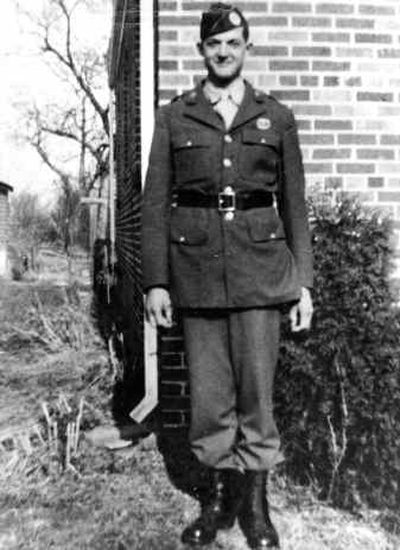War hero enriches soul history

For a culture’s soul survival, the elders among us must remember the past and then pass on the remembering. Joe E. Mann, who grew up in Reardan, did not live long enough to become an elder. He died during World War II, at 22, in a trench in Best, Holland. Mann’s arms were bandaged to his body due to bullet wounds suffered the day before. When a grenade landed in the trench, Mann yelled “I’m taking this one!” and fell upon it. The blast killed him but saved many others.
Mann received, posthumously, the Medal of Honor, Bronze Star, four Purple Hearts and other honors. The current debate over Sen. John Kerry’s heroism in Vietnam wearies the soul. So I traveled Tuesday to Reardan on a journey back to a clearer time of heroism.
The guides on my journey were Matt and Polly Cunningham, Spokane folks who retired from demanding careers a few years ago and now travel and do good for others. While in Holland last year, a man asked them: “Do you know Joe E. Mann?” Polly said, “I’m from Reardan and I grew up with the story!”
The Cunninghams then drove to Best, where they took photos of the Joe E. Mann Pavilion, plus the 20-foot monument in his honor, plus the flower-shaped stone statue with his photo and story on it, plus the street named after him. Every September, to mark the anniversary of the American liberation of Holland and the heroism of Joe E. Mann, celebrations are held in Best. Fresh flowers are placed on his statue each day of the year, an act paid for in a villager’s will.
The Cunninghams, filled with this remembering, returned to Spokane. Through Polly’s Reardan connections, the couple tracked down Mann’s younger brother, Harold Mann, now 80, who lives in Edmonds, Wash. He told the Cunninghams, “I wondered if Spokane had forgotten him.”
An Army reserve center in Hillyard is named after Mann, but the Cunninghams wanted to make sure PFC Joe E. Mann, of the 101st Airborne Division, would be heralded here in other lasting ways, too. So for several months, they have undertaken a mission of remembering. On Tuesday, the Cunninghams met up with nine members of Mann’s extended family at the Reardan Memorial Library. They looked at Mann’s medals, displayed there in a locked case.
Joe was the fifth of nine children, born in 1922 to John Henry and Anna Mann, a couple who farmed wheat and raised cows and shared their huge garden with anyone in need. Irene Bennett, Mann’s sister who now lives in Ritzville, was 16 the day their pastor drove down the farm lane to deliver the news that forever etched sorrow into the heart of their mother.
In 1956, the village of Best invited the Manns to the dedication of the memorials to the young soldier who symbolized the courage of all the American liberators. Irene showed us her scrapbooks filled with clippings from the many visits family members have made to Holland. Harold Mann and his wife, Mary, will be in Best on Sept. 19, the 60th anniversary of Mann’s death.
The Cunninghams presented Harold with a flag flown over the U.S. Capitol to be given to the mayor of Best. They gave family members the proclamation by Spokane Mayor Jim West declaring Sept. 19 “Joe E. Mann Day.” They shared the news that children at Woodridge Elementary School, where the Cunninghams volunteer, will be pen pals with children in Best. And the students, along with Starbucks Coffee, their business partner in education, will tend to Mann’s grave at Greenwood Cemetery in north Spokane.
The family members looked stunned. Their eyes pooled with water. Psychologist and author James Hillman once wrote: “The past lies under graves, buried, but the memory of these moments in our soul history keeps their values alive.”
Joe E. Mann’s life and death reflected values that get lost during petty arguments about Kerry’s war record. We have much to learn from the remembering done about Mann in a village far away. His heroism is part of our soul history here, too. May it endure another 60 years.